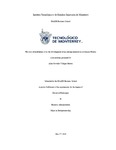Mostrar el registro sencillo del ítem
The role of institutions over the development of an entrepreneurial ecosystem in Mexico
| dc.contributor.advisor | Amorós Espinosa, José Ernesto | |
| dc.creator | Villegas Mateos, Allan Oswaldo | |
| dc.creator | 694195 | |
| dc.creator | https://orcid.org/0000-0002-7431-5326 | |
| dc.date.accessioned | 2019-07-09T20:09:32Z | |
| dc.date.available | 2019-07-09T20:09:32Z | |
| dc.date.created | 2015 | |
| dc.identifier.citation | Villegas Mateos, A. O. (2019). The role of institutions over the development of an entrepreneurial ecosystem in Mexico (Doctoral Dissertation). Instituto Tecnológico y de Estudios Superiores de Monterrey, Mexico. | es_MX |
| dc.identifier.uri | http://hdl.handle.net/11285/633015 | |
| dc.description.abstract | The Entrepreneurial Ecosystem approach tries to understand the mechanisms behind new businesses creation and helps developing tools, governmental policies, and support systems that enhance entrepreneurship activities outcomes. To ensure a better understanding of those mechanisms this thesis aims to contrast the importance of regional policies in emerging Latin American economies designed to foster local new business creation and development through the case of Mexico. Therefore, this work is divided in three empirical studies conducted using data from one of the Global Entrepreneurship Monitor’s surveys, the National Experts’ Survey (NES) which measures the Entrepreneurial Framework Conditions (EFCs). The first study of this work follows a qualitative methodology to provide a general overview of the Mexican entrepreneurial ecosystem obtained from the experts’ responses to nine open questions of the NES. The second study analyses the quantitative responses of experts located in different entities of Mexico for which we used non-parametric statistics to evaluate the different perceptions of the EFCs. Also, this study follows the replication and adaptation of a Chilean research to generalize and validate the findings to contribute to the literature of regional entrepreneurial ecosystems. On the other hand, the third study uses structural equations models to test the directions of the EFCs that measure the entrepreneurial education, and cultural and social norms. This research was the result of identifying, in the first study, the key role of entrepreneurial education and training in the entrepreneurial ecosystem, and the differences of it between central to non-central regions in the second study. The main results of this work indicate that the government has a moderating effect to control through policies and programs the outcomes of the entrepreneurial activities. Nevertheless, each institution is responsible of understanding which actions are fostering and which are obstructing the entrepreneurial activities to improve the efficiency and build together a more dynamic entrepreneurial ecosystem in terms of opportunities being followed by entrepreneurs. Therefore, the general implication of this thesis underlies on the fact that the location of a person changes its opportunities to create a new business or grow an existing one, whether, it is necessity or opportunity driven. Hence, this thesis was not limited to high nor low levels of innovation, because all the experts responded accordingly to their own evaluation of the general status of the EFCs in their country/region’s economies towards new business creation and development. Finally, this thesis implication for the Mexican government results that it must prioritize the homologation of the opportunities for people whether they are in big cities or small cities, and by that it means understanding the cultural and institutional context of each location. Consequently, this thesis contributes to the regional development literature of emerging Latin American countries and sets new lines to conduct future research in the last chapter. | es_MX |
| dc.format.medium | Texto | es_MX |
| dc.publisher | Instituto Tecnológico y de Estudios Superiores de Monterrey | spa |
| dc.relation.isFormatOf | versión publicada | es_MX |
| dc.rights | Open Access | es_MX |
| dc.rights.uri | http://creativecommons.org/licenses/by-nc-nd/4.0/ | * |
| dc.subject | CIENCIAS SOCIALES | es_MX |
| dc.subject.lcsh | Social Sciences | es_MX |
| dc.title | The role of institutions over the development of an entrepreneurial ecosystem in Mexico | es_MX |
| dc.type | Tesis Doctorado / doctoral Thesis | es_MX |
| dc.contributor.committeemember | Moya Dávila, Fernando Andrés | |
| dc.contributor.committeemember | Larios Hernández, Guillermo Jesús | |
| dc.publisher.institution | Instituto Tecnológico y de Estudios Superiores de Monterrey | es_MX |
| dc.subject.keyword | Entrepreneurial ecosystems | es_MX |
| dc.subject.keyword | Mexico | es_MX |
| dc.subject.keyword | Key players | es_MX |
| dc.subject.keyword | Entrepreneurial activity | es_MX |
| dc.subject.keyword | Regional development | es_MX |
| dc.subject.keyword | Institutions | es_MX |
| dc.contributor.institution | EGADE Business School | es_MX |
| dc.contributor.institution | EGADE Business School | es_MX |
| dc.contributor.institution | Campus Santa Fe | es_MX |
| dc.description.degree | Doctorado en Ciencias Administrativas | es_MX |
| dc.audience.educationlevel | Público en general/General public | es_MX |
| dc.relation.impreso | 2019-05-02 |
Ficheros en el ítem
Este ítem aparece en la(s) siguiente(s) colección(ones)
-
Ciencias Sociales 565
Gobierno y Transformación Pública / Humanidades y Educación / Negocios / Arquitectura y Diseño / EGADE Business School




